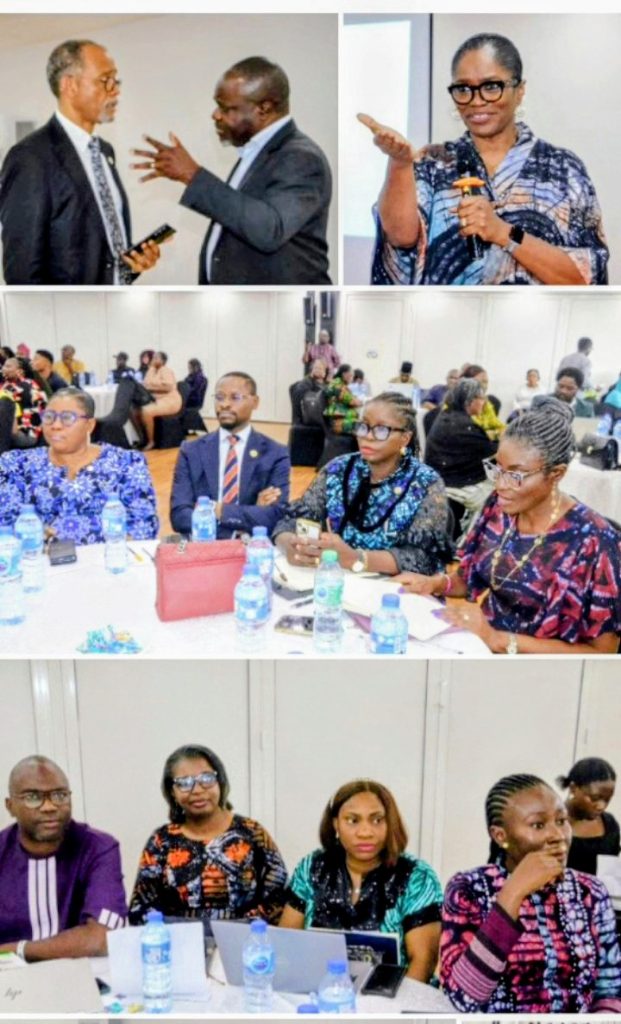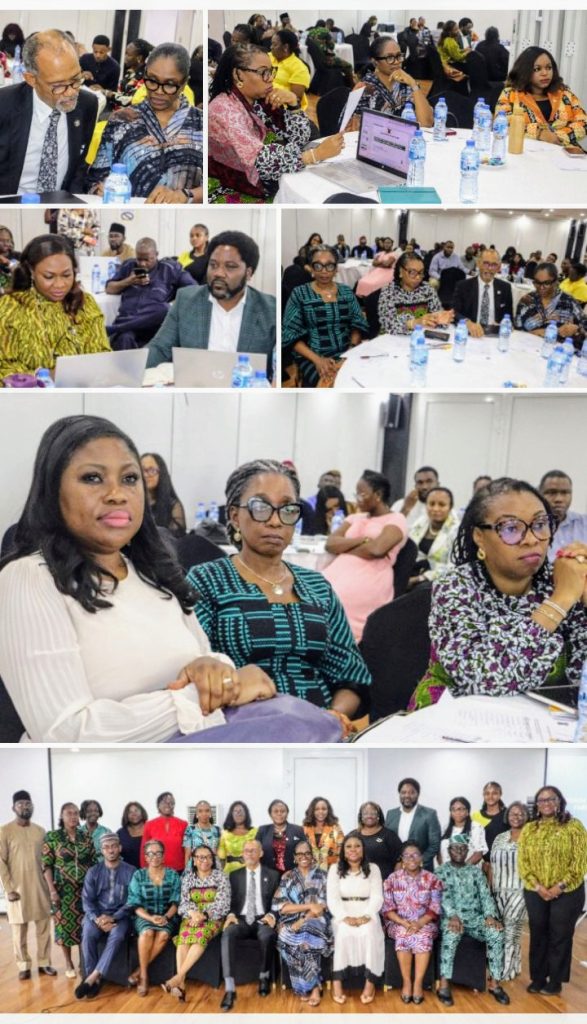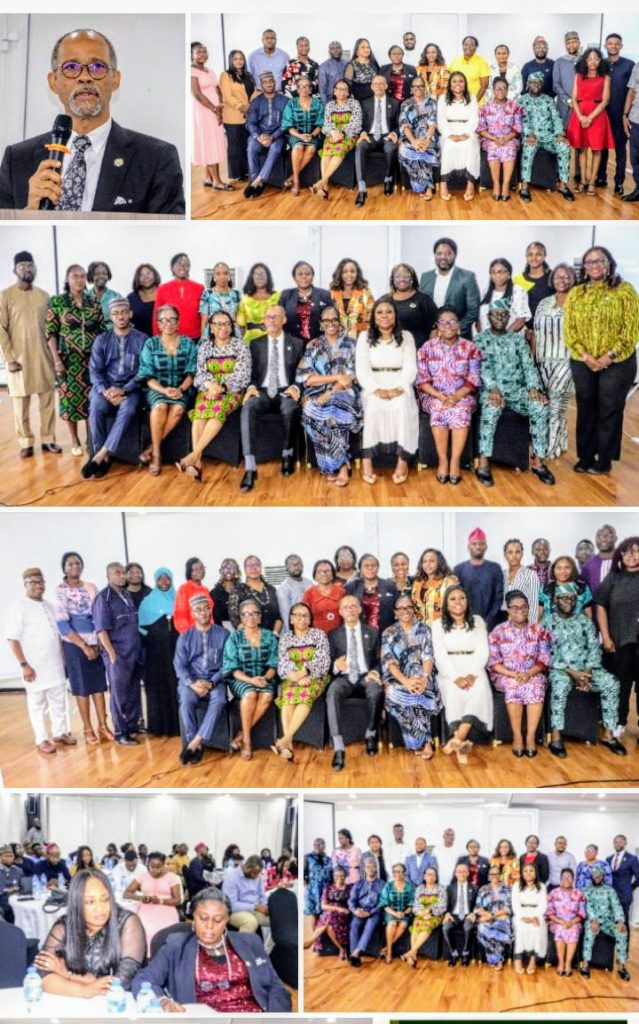…. As Ministry of Health Partners with Donors to Drive Strategic Healthcare Initiatives
By Aminat Umar

In a significant event today at BON Hotel, Ikeja, the Lagos State Ministry of Health brought together key development partners and donor organizations to unveil an ambitious health agenda for 2025. This pivotal gathering aimed to strengthen collaborations and align efforts toward enhancing healthcare delivery across the state. With representatives from major donor bodies and health experts in attendance, the Ministry outlined a comprehensive plan focusing on improved infrastructure, expanded access to essential services, and innovative solutions to tackle public health challenges. The event emphasized the importance of strategic partnerships in achieving sustainable health outcomes for all residents of Lagos.
In a press statement signed by the Director, Public Affairs of the ministry, Tunbosun Ogunbanwo, it states that the engagement meeting marked a crucial step in fostering collaboration between the Lagos State Ministry of Health and its development partners. Held at BON Hotel in Ikeja, the gathering aimed to define roles, strengthen alliances, and set priorities for strategic health interventions across the dynamic metropolis. With a focus on collective action, the meeting underscored the importance of coordinated efforts to address key health challenges, paving the way for a healthier and more resilient Lagos.
The event showcased the Sector-Wide Approach (SWAp) to Health, a strategic model initiated by the Federal Ministry of Health. This framework promotes government leadership, pooled resources, and a cohesive strategy among stakeholders, aiming to harmonize efforts in improving health services across Lagos. By encouraging collaboration and a unified vision, SWAp seeks to streamline initiatives, ensuring that health interventions are more efficient, impactful, and aligned with the state’s overall development goals.
On the basis of this however, the meeting aimed to establish a unified direction for the future of healthcare in Lagos. Key objectives included aligning strategic goals, strengthening collaboration among stakeholders, reassessing funding priorities, and tackling pressing challenges. By fostering open dialogue, the gathering sought to build a more coordinated approach, ensuring that resources and efforts are effectively channeled to improve health outcomes across the state.
The state’s Commissioner for Health, Prof. Akin Abayomi, emphasized the critical role of development partners in advancing Lagos’s healthcare sector. “It’s essential that donor interventions align with our strategic health objectives,” he remarked, calling for clear communication and stronger collaboration among all stakeholders. Prof. Abayomi stressed that a unified approach is key to building a more effective and resilient health system, urging partners to work closely with the state to achieve shared goals.
Prof. Abayomi envisioned a brighter future for Lagos’s health sector, advocating for a transformative move toward a cashless health system. He emphasized that adopting digital payment solutions would streamline services, improve efficiency, and make healthcare more accessible to all. This vision, he noted, reflects a broader commitment to modernizing the sector and ensuring seamless, patient-centered care across the state.
Prof. Abayomi highlighted the need for a strong insurance framework to support automatic payments through pooled funding. He explained that this approach would encourage greater investment and drive innovation within the healthcare sector. By ensuring seamless financial transactions, the framework aims to make healthcare more efficient, accessible, and sustainable, paving the way for a modernized system that attracts new resources and ideas.
Prof. Abayomi proudly shared that a recent independent assessment ranked Lagos as the 8th leading city in Africa for healthcare delivery. He attributed this achievement to the ongoing reforms and improvements within the sector, highlighting the city’s dedication to enhancing its health services. This recognition, he added, underscores Lagos’s ambition to become a premier regional healthcare hub, reflecting its commitment to quality care and continuous progress.

Moreso, he offered a stark outlook on the future of healthcare in Lagos, cautioning about the city’s rapid population growth, which is expected to surge to 40-50 million within the next 10 to 15 years. He noted that this demographic boom, combined with a vast informal sector, poses challenges, particularly in maintaining a low tax-to-GDP ratio. This scenario, he warned, could strain existing health resources, emphasizing the need for strategic planning and robust policy measures to ensure sustainable healthcare services. “Despite Lagos being the economic hub of West Africa, our health sector remains underfunded and outside the mainstream economy,” he maintained.
Prof. Abayomi proposed a bold transformation of the health sector into a fully cashless system, advocating for the establishment of a strong insurance framework. He emphasized that this model would enable automatic payments through pooled funding, streamlining transactions and ensuring more efficient resource allocation. This shift, he suggested, would not only simplify the payment process but also attract investment and drive innovation in healthcare delivery across Lagos. “We must improve our facilities and create a competitive environment within the health sector to drive investment and innovation,” he says.
He also revealed that the State Government is making strides to establish the University of Medicine and Health Sciences, a key initiative aimed at boosting the training and production of medical professionals. Alongside this, the government is implementing policies focused on human capital development to ensure a steady pipeline of skilled healthcare workers. Additionally, efforts are underway to secure funding for the revitalization of primary healthcare, reflecting a comprehensive strategy to strengthen the entire health sector in Lagos.
Prof Abayomi emphasized that these proactive initiatives pave the way for a bright future, signaling greater opportunities for healthcare investment in Lagos. This forward-thinking approach, he noted, sets the stage for sustained growth and innovation within the sector.
The Commissioner outlined Lagos State’s ambitious vision to attract two million medical tourists annually by 2052, a goal that includes plans to vastly expand hospital bed capacity and sharply lower maternal and infant mortality rates. He emphasized that these initiatives reflect the state’s unwavering commitment to enhancing public health and solidifying Lagos’s position as a premier destination for medical tourism in Africa. Through these efforts, the state aims to set new standards in healthcare excellence and accessibility.

The State Government has reaffirmed its commitment to a comprehensive infrastructure overhaul, aiming to address the growing healthcare needs of Lagos’s diverse population. Highlighting this initiative, officials revealed ambitious efforts to increase health insurance coverage from just 1% to 50%. This strategic move seeks to make healthcare more accessible and affordable, ensuring that more residents can benefit from essential medical services “This initiative aims to ease the financial burden on families, ensuring that quality health services are within reach for all”, he stated.
Dr. (Mrs.) Kemi Ogunyemi, the Special Adviser to the Governor on Health, expressed her enthusiasm for the rapidly evolving healthcare landscape in Lagos. Speaking at the meeting, she emphasized the significance of the diverse representation of stakeholders, noting that collaboration is key to addressing the city’s varied health needs. Dr. Ogunyemi highlighted the shared commitment to building a stronger, more inclusive health ecosystem that serves all residents effectively.
“It’s fantastic to see so many organizations committed to safety and quality care,” she said. “Together, we can ensure that our citizens receive the best possible healthcare.”
Dr. Ogunyemi stressed the crucial role of partnerships in addressing Lagos’s healthcare challenges, acknowledging that the Ministry of Health cannot tackle them single-handedly. She called for collective efforts, highlighting that collaboration with various stakeholders is essential to build a resilient and effective health system that meets the needs of all residents. “We recognize that your input and expertise are invaluable to our policies and initiatives,” she remarked. “Without your support, we would struggle to meet our objectives. It’s wonderful to see so many dedicated partners here today, working alongside us to improve health outcomes in Lagos.”
She underscored that securing adequate funding and investing in human capacity development are crucial to tackling the challenges in Lagos’s healthcare sector. Emphasizing their importance, she noted that these elements form the backbone of a strong, resilient health system capable of addressing the city’s diverse and growing needs.
“While financial resources are essential, they alone cannot address our healthcare needs,” she explained. “We must also invest in training and developing our workforce. Your organizations are instrumental in this process, and we deeply appreciate your commitment to providing the support and data necessary for our ongoing improvement.” Dr. Ogunyemi concluded by reaffirming her optimism about the future, stating, “We’re all here with a common objective, and I look forward to collaborating with each of you to elevate healthcare in Lagos to new heights.”
The meeting brought to light the pressing need to tackle health disparities by strengthening primary healthcare services. By enhancing these frontline facilities, the goal is to ease the burden on secondary and tertiary hospitals. A key theme was the growing partnership with the private sector, reflecting a united effort to build a more accessible and efficient healthcare system for all residents
The meeting ended with a strong pledge from all stakeholders to build a collaborative environment focused on the health needs of Lagos residents. Prof. Abayomi urged development partners to harness their resources and expertise, emphasizing that their contributions should lead to impactful and sustainable healthcare solutions for the city.









